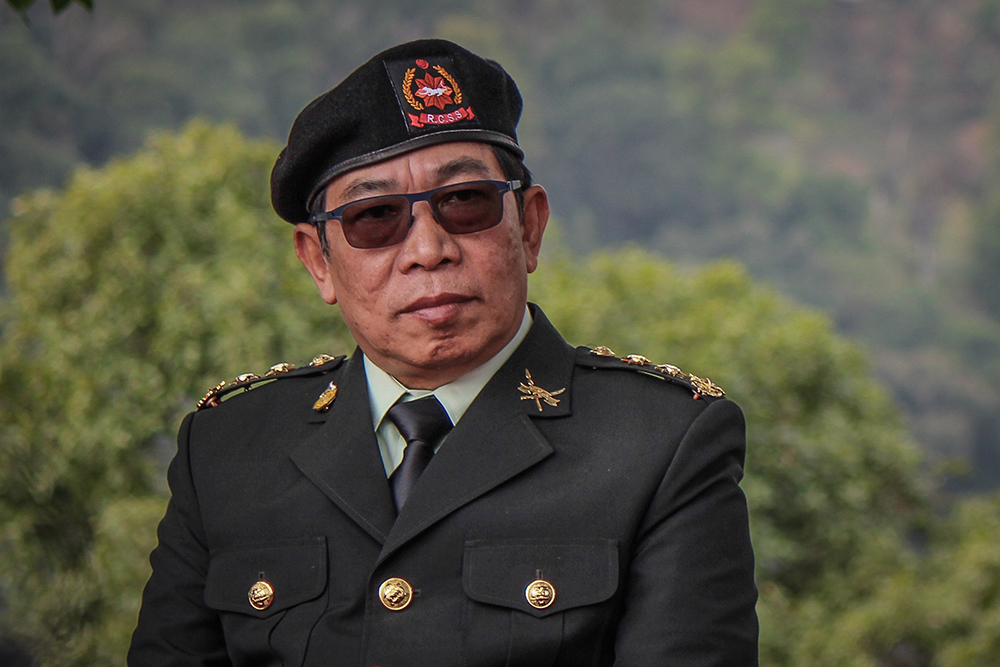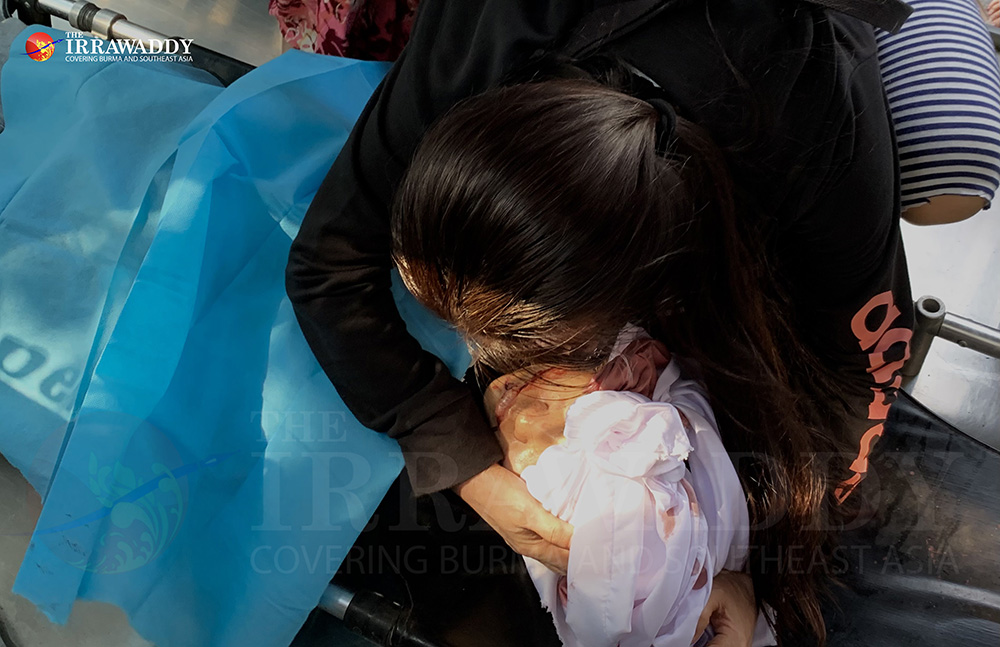Myanmar’s military must be held accountable for its crimes against humanity, and the sooner the better, warned a leading ethnic rebel leader. “No one trusts the Myanmar army,” Yawd Serk, chairman of the Shan armed rebel group the Restoration Council for Shan State (RCSS), said on the eve of Armed Forces Day, which falls on Saturday. The junta is illegal and unconstitutional, and all 14 members of the State Administrative Council (SAC) should be indicted for their complicity in the unnecessary deaths of more than 300 innocent, unarmed civilians, he said.
In an extensive interview, the Shan leader expressed abhorrence at the behavior of the Myanmar troops, while pointing out that ethnic communities living in the border areas had experienced this sort of brutality for more than 50 years. He said the RCSS supported the movements that have sprung up all over the country in opposition to the military takeover and, critically, indicated the Shan’s willingness to work with them.
He emphasized that the root cause of the current crisis was the 2008 Constitution, saying it should be scrapped and replaced by a federal democratic constitution. Until then, he said, there could be neither freedom nor lasting peace. But he was also careful to dampen expectations that the RCSS or other ethnic groups would be rushing to provide physical support to the protest movement—though they now clearly have a common enemy.
The Tatmadaw (Myanmar’s military) has shown its true colours, he said, describing them as “terrorists” and accusing the military of breaching the peace pact it signed with the RCSS. The Shan leader said his group had suspended all senior-level contact with the military since the coup on Feb. 1 and would not be attending the Armed Forces Day parade in Naypyitaw on Saturday, though they had been invited. “We told them we’re unavailable,” quipped Yawd Serk.
Most of the other ethnic groups that signed the Nationwide Ceasefire Agreement (NCA) with the U Thein Sein government in October 2015 have also opted out of the Naypyitaw event. The Karen National Union—the other major ethnic group amongst the NCA signatories—has also just released its response to the junta’s invitation, which is even more hard-hitting, demanding that the military withdraw troops from civilian areas, release all prisoners, roll back all laws and changes introduced by the coup leaders that violate human rights, return to the barracks and renounce politics, commit to the creation of a Federal Union, and allow international intervention to mediate a transfer of political power to a unity government.
One of the major non-signatories to the ceasefire pact, the Kachin Independence Organization, is also not attending. This is a significant blow to military leaders’ efforts to portray themselves as the saviors of the country, and casts doubts on their claim to be able to bring peace to the country in the next 12 months, during the military government’s declared state of emergency.
Armed Forces Day—formerly known as Resistance Day—is the Tatmadaw’s premier anniversary celebration, commemorating the day on which the Burmese army launched its resistance campaign against the Japanese occupation in 1945, which then grew into the liberation and independence movement. This year, a “colossal” celebration is planned, according to military-run media.

Of course, nothing could be further from the truth than the scenario of “peace, stability and growth” that the military plans to celebrate. Since the coup, the country has descended into chaos and violence, as the country’s security forces ruthlessly try to crush the opposition, protests and civil disobedience movement. More than 300 people have been killed in the nearly eight weeks since the military seized power, while more than 2,000 activists, protesters and journalists are in prison.
“It should now be known as the Myanmar army’s ‘day of shame,’” Dr. Sa Sa, the special envoy to the international community appointed by the Committee Representing Pyidaungsu Hluttaw (CRPH), said in a recent interview. The committee was formed by elected MPs to Myanmar’s Union Parliament (Pyidaungsu Hluttaw). “The Tatmadaw should no longer be called the Army of Myanmar—they have failed to protect the people and the country—instead they have become the attackers, they have become the enemy of the people, they have terrorized 54 million people since Feb. 1,” he said.
“It’s terrorizing the people, it’s waging war against the people, it’s killing the people,” he said. “It’s the army that is committing crimes, not our leaders [referring to Daw Aung San Suu Kyi and other National League for Democracy leaders] … They must be made accountable for their crimes against humanity.”
The CRPH plans to press ahead with lodging cases against Myanmar’s military at the International Court Justice (ICJ) and the International Criminal Court (ICC)—the two top international human rights court, both based in The Hague. After the CRPH forms an interim national unity government at the end of the month, it plans to sign the Treaty of Rome to allow it to present its case to the ICC, according to Dr. Sa Sa.
“The Tatmadaw must be held accountable for their crimes against humanity—and while the CRPH aim is good, the difficult [part] is how to make it happen,” said Yawd Serk. But it needs to happen quickly, he insisted, as the credibility of the CRPH is on the line.
The RCSS has not broken off relations entirely with the junta; the liaison office in Taunggyi continues to operate and there are the usual bilateral talks on technical issues, such as troop movements, skirmishes and disputed boundary demarcation. But political discussions and talks have been suspended till further notice, he said. There have been no high-level telephone calls or exchanges. The Shan leader has even refused to take telephone calls from the junta’s top generals: Senior General Min Aung Hlaing and Vice Senior General Soe Win.
At issue is the fact that the Myanmar military has breached the NCA, something that requires a response, he said. “The NCA is not dead yet,” he said, adding that the breaches need to be addressed and punished.
Yawd Serk went on to explain the key breaches of the NCA: since seizing power illegally, the military has begun killing unarmed civilians, which is unacceptable and contravenes the NCA, and cannot be allowed to happen with impunity; furthermore, the peace agreement specifically prohibits troops being stationed or quartered in temples, a provision the Tatmadaw has also ignored.

From the RCSS’ perspective, this is an illegal and illegitimate government, and its behavior entirely unacceptable, he said. “But above all they have broken the trust.”
While the Shan leader made no bones about where he and the RCSS stood—with the people against the army—he was less enthusiastic about its support for the CRPH and even less for its much-vaunted proposal for a Federal Army. “It’s guarded support,” he suggested.
“We are having informal talks, communicating and sharing information,” he explained, but added that beyond a few declarations on Facebook, the CRPH had offered few details on its vision for a unity government, an administrative structure or a new federal constitution. He said the RCSS was “watching” the committee’s moves but “doesn’t recognize the CRPH—at the moment at least—but we are talking, we are talking—so there is informal recognition.” He added, “But we need to be convinced of the authority and the credibility of the CRPH.”
Understandably for the RCSS leader, the crucial issue is that of federalism. Both sides need to agree what federal principles are, he said, and as yet there had been no such discussion. “Our concern is that it’s a flash fire—and will quickly go out,” he said.
In order to agree on a federal constitution, the CRPH and the RCSS would have to come together and talk about federalism and the constitution, he said—if the committee announced a statement without proper consultation, then that wouldn’t be particularly helpful. But that could be a basis for further discussion, the RCSS leader said, adding that more talks and consultation are needed. They should talk to us before they release their statement, he suggested. “If they release a draft constitution without having consulted us, that would not be acceptable – everything needs to be discussed in talks before that stage.”
The EAOs have done a lot of work already on federal and democratic principles, and already have an agreed draft constitution, including separate individual state constitutions, he explained. That should be the basis of any talks about creating a federal state, Yawd Serk said.
The Shan leader said that while he understands the present time is volatile and fraught—made all the more difficult because of COVID travel restrictions and the regime’s disruption of the internet and mobile phone communications—he recognizes that a new era may be dawning in which the ethnic groups and Myanmar’s pro-democracy political parties can craft a new constitution that could lead to a genuine federal democracy.
“It isn’t time for an interim government—there should be a long-term government,” Yawd Serk said. Comprehensive and inclusive talks are needed before further statements are issued, he said. In the roadmap he envisages, the first stage would be those talks, involving the CRPH, the ethnic political parties and the ethnic groups, including the EAOs. This he expects to take up the next three months.
The next stage would be talks focused on federalism and the constitution—coming together, talking together and coming to an agreement. At that point the formation of a Federal Army would be discussed: How do they want to set it up? What would be its organization and its structure? Only then would the implementation of a federal government and administration begin to be worked out. That must include power sharing arrangements with local administrations and communities, he insisted.
“We want real and lasting peace: not just to stop the shooting,” said Yawd Serk. And a federal constitution is the crucial starting point; then it is step-by-step.
“But if there isn’t Federalism, then we will fight for independence – and we will surely win,” he warned.
You may also like these stories:
Myanmar Regime ‘Murdering the Hopeful Future of the Country in the Streets’: Ex-US Ambassador
Twin Brother of Young Protester Slain by Myanmar Security Forces Calls for Justice
Family of Police Crackdown’s Victim Urges Rooting Out Dictatorship

















